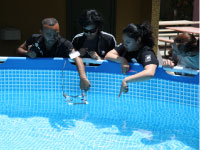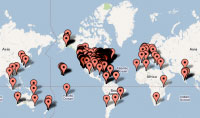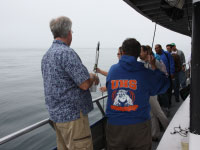COSEE-West, based at University of California Los Angeles and the University of Southern California, is situated in a metropolis of 10 million people that has one of the most diverse populations in the nation. Though the metro area is coastal, relatively few citizens recognize the importance, value, or vulnerability of the planet’s most important characteristic - the ocean. We at COSEE-West are constantly renewing our broad array of projects and events to find creative and practical ways to connect marine scientists with many audiences, and to deliver ocean science information and experiences to this varied community.
| |  |
| Middle school teachers from Marina Del Rey try out their remotely operated vehicles as part of a course presented by COSEE-West. Photo: Jane Lee |
One sign that our programs are helping meet the needs of our community is the growing interest from educators, scientists, and our institutional partners in suggesting and supporting new programs. We were pleased when a team of teachers from Marina Del Rey Middle School - who had attended COSEE-West workshops during the first 5 years of our programs - approached us with a request for multi-year professional development training in ocean sciences. We worked with the teachers to organize a course that combines information, field experiences, and teaching ideas, and that is taught during the summer. The teachers’ new knowledge and skills are helping their students look past the concession stands and volleyball nets at the beach to see and investigate the waves, water, and sea creatures at the shore.
Teachers and scientists both benefit from the collaboration in a new program that is bringing marine science into LA-area charter schools. The Los Angeles Charter School Science Partnership (LACSSP) is an initiative of the California Mathematics and Science Partnership (CaMSP) of the California Department of Education. The partnership includes COSEE-West, the University of Southern California (USC), the Los Angeles Education Partnership (LAEP), participating Charter Schools, and Gary Scott of the USC Rossier School of Education, which is providing Model-Based Science Inquiry for science teachers of grades 3 - 8. Before each marine science presentation for the teachers, COSEE-West staff work with the scientist to be sure that the concepts are clear; that sufficient background information is included; and that there will be connections to topics in the curriculum. The scientists’ presentations provide a rare chance for the teachers to hear in-person tales about what it’s like to do science, from pursuing an unexpected observation to fixing a piece of equipment at sea. For the scientists, the programs provide an important avenue for outreach and communication, with the advantage of reaching hundreds of students by working with teachers. With guidance from COSEE-West staff and graduate student scientists, the teachers develop a research question they can answer during the field studies that make up part of the program. The result: teachers who are engaged in research and scientists who are engaged in education, and both are enthusiastic about the process.
| |  |
| Map of participants in a recent online workshop offered by COSEE-West and the College of Exploration. Map: courtesy of College of Exploration |
The COSEE-West staff makes a continual effort to understand and meet the needs of our community. Since online workshops provide a flexible schedule for participants and a versatile platform for presenting marine science, we deliver two professional development workshops in that format each year. Recognizing that the topic of evolution has a central place in the biology curriculum, but that few textbooks or teaching resources include marine case studies or examples, we chose Evolution in the Marine Environment as the focus for our Fall 2010 online workshop. We collaborated with our partners at the College of Exploration and marine scientist Dr. Pat Krug of CSULA to offer participants (from across the US and several foreign countries) a combination of online presentations and our premier live web broadcast of a lecture about evolution, all with a marine focus; near-real time interactions and personal responses from Dr. Krug and graduate students in his research lab; and discussion strands on teaching ideas. Dr. Krug and the graduate students who made up the science team for this workshop commented that the experience was surprisingly valuable and beneficial to them, as they clarified their own thinking and composed postings to explain their research and respond to participants' questions.
 | |
Teachers in the Ocean Observing Systems professional development course prepare to deploy a CTD off the coast of California. Photo: Jane Lee | |
A regularly renewed connection for COSEE-West is its alliance with informal science education centers. As the National Science Teachers Association has noted, “Informal science education is often the only means for continuing science learning in the general public beyond the school years” (NSTA Position Statement on Informal Science Education, 1999). To promote science literacy and ocean literacy, COSEE-West has established strong partnerships with a powerful network of informal science education centers (ISEC), including aquariums, science museums, and interpretive centers. In this year’s professional training for ISEC staff and volunteers on marine science topics, scientists described research related to high-interest ocean issues. Through these programs, as in the lecture-workshop series, scientists can have an impact on a large number of people by working closely with professional educators to confirm scientific content and language, and to review the creative activities developed by educators to engage and inform public audiences.
Climate change is a pressing issue requiring public understanding of basic science and the role of the ocean, and COSEE-West programs continue to reflect the importance of this major current in science and education. Our ongoing partnership with NASA’s Jet Propulsion Laboratory provides a forum for scientists to present lectures and programs on the ocean, remote sensing, and technology. Partnership events in 2010 ranged from a lecture introducing satellite data from CloudSAT to an annual public Climate Day where scientists and educators work together to translate climate science into displays, activities, and presentations attended by hundreds of community members. Climate is also the focus for many of COSEE-West's in-depth programs, and climate scientists are frequent presenters in our multi-year programs with teachers, as well as in the credit course for teachers we offer annually in partnership with the Cooperative Institute for Research in Environmental Sciences at the University of Colorado.
These are some highlights from COSEE-West’s current programs, which have earned us the nickname of “the go-to source for marine education” from area teachers. It's an exciting time to be a part of the confluence of marine science and education, and we look forward to this year's array of projects with high hopes for ocean science to be carried far and wide!
Contributed by Pat Harcourt
Visit COSEE-West!

